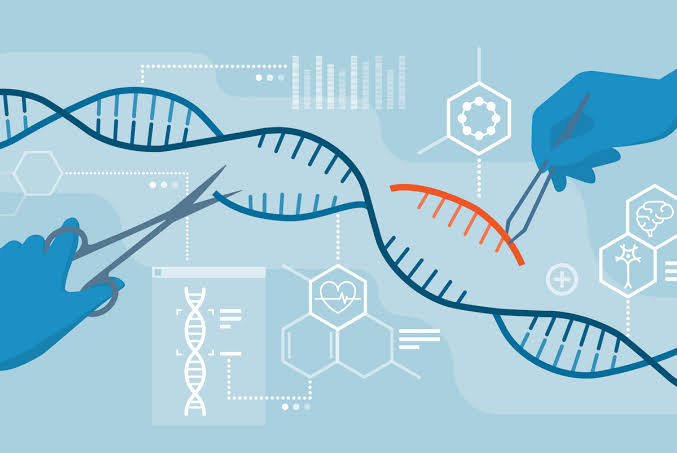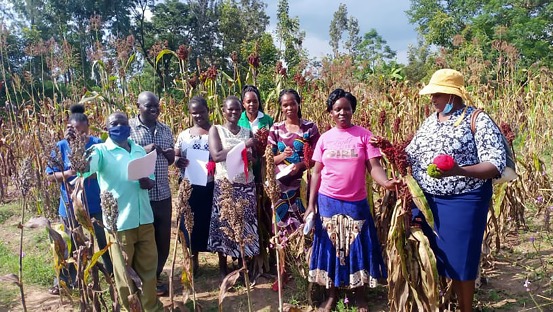KISII, Kenya, Aug,13- Food security is a major challenge that needs to be addressed in the face of mounting environmental challenges and more so in Sub-Saharan Africa, experts have cautioned.
Land degradation due to climate change has put agriculture and food production into a crisis, while the invasion of Ukraine by Russia has threatened food production and supply around the globe.
Director of the Center for Resilient Agriculture for Africa Dr. Stephen Mugo says at least 2.6 million people face food insecurity while 35 percent of the total population is suffering from malnutrition and food insecurity in Kenya.
“As of today, rapid population growth, climate change, and insufficient food system are the main factors contributing to food insecurity in Kenya,” said Dr.Mugo.
While making a presentation during a media science café on the overview of the food security situation in Kenya, Dr. Mugo asked the government to lift the ban on Genetically Modified Organisms (GMOs) for livestock feed, approve the yellow maize, yellow beans, and Bt maize, lower taxation for food and food-related products.
According to the famine early warning system network, about 3.5 million people are in the blink of severe hunger even as prices of scarcely available food rise up drastically.
In Kenya, the IPC Acute Food Insecurity Analysis and Acute Malnutrition Analysis (July 2021-January 2022 issued in September 2021 indicates that 2.1 million population in arid and semi-arid areas are experiencing high levels of food insecurity between July and October 2021.
The report further indicates the majority of these populations facing acute malnutrition are pastoralists in Baringo, Isiolo, Marsabit, Tana River, Garissa, Mandera, and Wajir.
The United Nations Conference on Trade and Development indicates Africa imported at least 85 percent of its food from 2016 to 2018 from other continents amounting to US35bn and is expected to reach US 110bn by 2025.
Director East Africa Hub and the leading biotechnologist at the Institute of Tropical Agriculture (IITA) Dr.Leena Tripathi paints a grim image of the unprecedented food crisis and calls for an immediate intervention to save the situation.
Dr. Leena says food security needs to be addressed in feeding the growing population in Africa.
“There is a need to double our production to feed the increasing population witnessed across African countries,” said Dr. Tripathi.
She added that food security can only be achieved through scientists helping farmers adapt to climate change and updated on scientific agriculture innovation through biotechnology.
New breeding technologies such as genome editing offer a viable option in addressing food insecurity.
For scientists, Gene editing is one of the safest solutions to crop improvement with potential benefits on yield improvement on grain weight, size, and number, enhancement of nutrition value in crops.
Director of International Service for Acquisition of Agri-biotech Applications (ISAAA Africenter) Dr. Margret Karembu said food suitability is a challenge that needs to be addressed in feeding the globe.
She said scientists have increased tools such as genome editing to improve food production.
“Africa is a victim of science, policymakers should provide a fair environment for scientists and researchers,” said Dr. Karembu.
She noted, Scientists around the globe have carried out research studies on genetically modified food and found it safer for crop growing process.
“Gene editing helps on herbicide tolerance, weed control, abiotic stress tolerance in crop production,” said Dr. James Karanja a senior scientist at Kenya Agriculture Livestock Research Organization. (KALRO)
Speaking during a science café with Journalists, Dr. James Karanja said gene editing can be used to add remove or alter DNA in the genome while genome editing is a technique used to precisely and efficiently make specific changes to a DNA in a cell or organisms.
Clustered Regularly Interspaced Short Pandemonic Repeats (CRISPR) technology which won the Nobel prize 2020 is the most popular genome editing approach.
KALRO in collaboration with other partners adopted the use of gene editing to improve the resistance of maize to necrosis disease in creating a high-yielding and resistant to Maize Lethal Necrosis (MLN) variety.
According (MLN) survey in 2019 incidence and impacts in Eastern and Southern Africa indicates, that during 2012-2013 the estimated maize yield loss due to MLN disease was 23-100. %
African Agriculture Technology Foundation (AATF) indicates, that the long-term goal of the TELA maize project will benefit farmers by making drought-tolerant maize and insect-protected maize varieties under moderate temperatures
TELA maize project will help produce quality grains and reduce insect damage thus reducing pesticide use and this will benefit both human health and the environment.
Gene editing projects in crops in Africa include Banana in Kenya, Maize in Kenya, Yam in Kenya, Sorghum in Kenya, Cassava in Uganda Cassava in South Africa and Wheat in Egypt.
International Seed Federation (ISF) has made steps to the adoption of science-based consistent policies for NBT products that would facilitate the development and uptake of advanced, innovative breeding applications by private and public breeders in developed and developing countries.
Development of striga smart sorghum in Kenya
Using the CRISPR-Cas9 technique, scientists at Kenyatta university developed a sorghum variety that is resistant to striga, a parasitic weed causing sorghum loss.
Prof. Steve Rono the project’s manager and lead researcher revealed heavy striga infection in the new variety.
“The striga smart sorghum will address food insecurity challenge by improving yield production in sorghum growing parts of the country,” said Prof.Runo.
Prof. Runo said trials were conducted in Homa Bay, Kibos, Mbita and Busia where most farmers rely on sorghum for their livelihoods, the striga has devastated the crop with a massive loss.
The striga smart sorghum was developed under a collaborative project between Kenyatta University and its partners. The project seeks to help farmers obtain complete Striga control and high sorghum yields.
“Farmers and consumers are the major beneficiaries of agriculture technology and they should be included in this conversation,” said Prof Runo.

Dr. Paul Chege a scientist at ISAAA says genome editing has the potential on improving character traits in both animals and crops.
“Kenya has adopted biosafety guidelines on genome editing and how genome editing should be regulated,” said Prof Chege.
He said the biosafety regulations address risk assessment on modified or improved products to ensure they are not harmful to both human health and the environment.
-Biotechnology Guidelines–
National Biosafety Authority acting Chief Executive Officer Dr.Roy Muchiri said the authority ensures the safety of genetically modified organisms to protect human health and the environment.
“The National Biosafety Authority controls genetically modified organisms through genetic engineering procedures to address risk assessment on biotechnology,” says Dr. Muchiri.
He said the authority has approved a number of projects undergoing trials including the BT cotton which is in the market.
He said they have received an application from KARLO which is conducting trials on MLN disease on Maize by making the product resistant in North Rift and South Rift to save the production.
They also received an application from a private entry conducting trials on maize variety to fix nitrogen in the soil by editing bacteria attached in the roots to fix nitrogen and this will help farmers to produce maize with less input use of fertilizer.
Prof Runo has successfully developed a sorghum-resistant Striga weed causing 100 percent loss of yield.
Scientists apply advanced technology approaches in crop production; however, the approach of biotechnology is not covered in the biotechnology act, therefore scientists have to fill in a form to initiate early consultations with NBT to prove if the product is ending with a GMO.
“Our biosafety molecule lab has a capacity to confirm if the product is ending with the GMO and following scientific procedures,” said Dr.Muchiri.
Want to send us a story? Contact Shahidi News Tel: +254115512797 (Mobile & WhatsApp)


